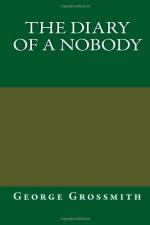In wonderment, I said: “What! after your engagement has been broken off?”
Lupin said: “Who said it is off?”
I said: “You have given us both to understand—”
He interrupted me by saying: “Well, never
mind what I said. It is
on again—there!”
CHAPTER XIII
I receive an insulting Christmas card. We spend a pleasant Christmas at Carrie’s mother’s. A Mr. Moss is rather too free. A boisterous evening, during which I am struck in the dark. I receive an extraordinary letter from Mr. Mutlar, senior, respecting Lupin. We miss drinking out the Old Year.
December 24.—I am a poor man, but I would gladly give ten shillings to find out who sent me the insulting Christmas card I received this morning. I never insult people; why should they insult me? The worst part of the transaction is, that I find myself suspecting all my friends. The handwriting on the envelope is evidently disguised, being written sloping the wrong way. I cannot think either Gowing or Cummings would do such a mean thing. Lupin denied all knowledge of it, and I believe him; although I disapprove of his laughing and sympathising with the offender. Mr. Franching would be above such an act; and I don’t think any of the Mutlars would descend to such a course. I wonder if Pitt, that impudent clerk at the office, did it? Or Mrs. Birrell, the charwoman, or Burwin-Fosselton? The writing is too good for the former.
Christmas Day.—We caught the 10.20 train at Paddington, and spent a pleasant day at Carrie’s mother’s. The country was quite nice and pleasant, although the roads were sloppy. We dined in the middle of the day, just ten of us, and talked over old times. If everybody had a nice, UNinterfering mother-in-law, such as I have, what a deal of happiness there would be in the world. Being all in good spirits, I proposed her health, and I made, I think, a very good speech.
I concluded, rather neatly, by saying: “On an occasion like this— whether relatives, friends, or acquaintances,—we are all inspired with good feelings towards each other. We are of one mind, and think only of love and friendship. Those who have quarrelled with absent friends should kiss and make it up. Those who happily have not fallen out, can kiss all the same.”
I saw the tears in the eyes of both Carrie and her mother, and must say I felt very flattered by the compliment. That dear old Reverend John Panzy Smith, who married us, made a most cheerful and amusing speech, and said he should act on my suggestion respecting the kissing. He then walked round the table and kissed all the ladies, including Carrie. Of course one did not object to this; but I was more than staggered when a young fellow named Moss, who was a stranger to me, and who had scarcely spoken a word through dinner, jumped up suddenly with a sprig of misletoe, and exclaimed: “Hulloh! I don’t see why I shouldn’t be on in this scene.” Before one could realise what he was about to do, he kissed Carrie and the rest of the ladies.




